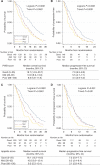Self-reported health-related quality of life is an independent predictor of chemotherapy treatment benefit and toxicity in women with advanced breast cancer
- PMID: 20389302
- PMCID: PMC2865758
- DOI: 10.1038/sj.bjc.6605649
Self-reported health-related quality of life is an independent predictor of chemotherapy treatment benefit and toxicity in women with advanced breast cancer
Abstract
Background: Baseline health-related quality of life (QL) is associated with survival in advanced breast cancer. We sought to identify patients who were less likely to respond to chemotherapy and at greater risk of toxicity on the basis of their QL.
Methods: We used data from three advanced breast cancer trials in which patients (n=378) were treated with cyclophosphamide, methotrexate and 5-fluouracil. Patients self-rated their QL using LASA scales for physical well-being (PWB), mood, pain, nausea/vomiting, appetite and overall QL. Multivariable regression models were constructed to compare overall survival (OS), objective tumour response (OTR), adverse events (AEs) and weight loss according to grouped QL scores.
Results: Physical well-being, mood, appetite and overall QL were significant univariable predictors of OS. Physical well-being and appetite remained significant after adjustment for baseline biomedical factors. Poor PWB was associated with lower OTR (odds ratio (OR)=0.21, 95% confidence interval (CI) 0.09-0.51), higher risk of non-haematological AEs (OR=3.26, 95% CI 1.49-7.15) and greater risk of weight loss (OR 2.37, 95% CI 1.12-5.01) compared with good PWB.
Conclusion: In women with advanced breast cancer, PWB and appetite are predictors of chemotherapy response and toxicity as well as survival. Quality of life should be a routine clinical assessment to guide patient selection for chemotherapy and for stratification of patients in clinical trials.
Figures


References
-
- Arbuck S, Ivy S, Setser A (1998) The Revised Common Toxicity Criteria: Version 2.0: CTEP Website. http://ctep.info.nih.gov
-
- Coates A, Gebski V, Bishop J, Jeal P, Woods R, Snyder R, Tattersall M, Byrne M, Harvey V, Gill G (1987) Improving the quality of life during chemotherapy for advanced breast cancer. A comparison of intermittent and continuous treatment strategies. N Engl J Med 317: 1490–1495 - PubMed
-
- Coates A, Gebski V, Signorini D, Murray P, McNeil D, Bryne M, Forbes J (1992) Prognostic value of quality-of-life scores during chemotherapy for advanced breast cancer. J Clin Oncol 10: 1833–1838 - PubMed
-
- Coates A, Thomson D, McLeod G, Hersey P, Gill PG, Olver IN, Kefford R, Lowenthal RM, Beadle G, Walpole E (1993) Prognostic value of quality of life scores in a trial of chemotherapy with or without interferon in patients with metastatic malignant melanoma. Eur J Cancer 29A: 1731–1734 - PubMed
-
- Coates AS, Hurny C, Peterson HF, Bernhard J, Castiglione-Gertsch M, Gelber RD, Goldhirsch A (2000) Quality-of-life scores predict outcome in metastatic but not early breast cancer. J Clin Oncol 18: 3768–3774 - PubMed
MeSH terms
Substances
LinkOut - more resources
Full Text Sources
Medical

